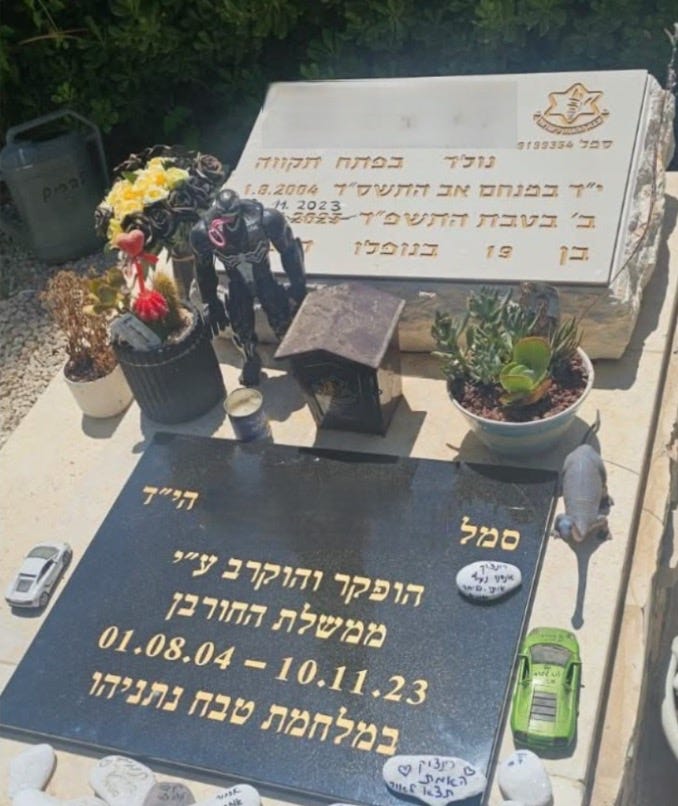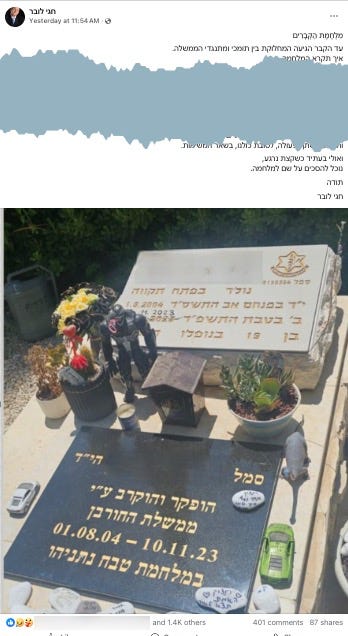"Beneath the tombstones lie sons and daughters who do not understand what we're arguing about."
Description
This is a country divided even over how to mourn.
As we noted in our post yesterday—about two bereaved fathers who have very different takes on former IDF Commander-in-Chief Herzi Halevi attending funerals of fallen soldiers—we are a nation still wrestling with the question of responsibility versus guilt, accountability versus forgiveness, what the name of this war should be and even the boundaries of where we can hash of all this out.
Everything feels raw, and the very little that’s barely started to heal feels like a scab that at any moment might accidentally get scraped off.
So it should probably not surprise us that even the “decorum” of cemeteries has become a subject of controversy.
The IDF is typically very strict about the layout of a gravestone at a military cemetery. More or less, they all look the same, and typically contain the following information, intentionally minimalist so as to emphasize the collective side of national memory. The typical gravestone lists:
Name: The full name of the fallen soldier.
Rank: The rank of the soldier.
Parents’ names: The names of the soldier’s mother and father.
Dates: The place and date of the soldier’s birth and death.
Emblem: The IDF symbol is the only symbol permitted on the headstone. Traditional religious symbols, like a Star of David, are generally not allowed to ensure uniformity across different faiths.
Date of Aliyah: especially decades ago, if the soldier had made aliyah, the date of his or her aliyah, and often the country from which that had come, was also listed.
For many decades already, there has occasionally been pushback from some parents who wanted to personalize their child’s grave. A few cases went to court, but by and large, not much has changed—which is as it should be, to my mind.
But all that is what made the “additional” plaque on this grave so stark. Here, the family added their own wording on a separate black “stone” as follows:
Sergeant [name erased in photograph]
Abandoned and sacrificed by the
government of destruction
August 1, 2004 - November 10, 2023
in the “Netanyahu’s Slaughter” war.
In a country accustomed to almost no variation on military graves, the sign is particular unnerving, and to some, deeply offensive. Some found it unfair to the Prime Minister, while others may have agreed with the message but felt that the cemetery was not the place.
The most compelling response was that of Hagay Lober, a rabbi and actor, writer and content creator, who, even though he lost his own son in the war, has been singularly eloquent in begging the nation to soften its discourse.

The post below just appeared this weekend. What follows is an AI-generated translation, with a few tweaks on my part. Adding anything to what Lober wrote would only detract.
“War of the Graves”
The dispute between government supporters and opponents has reached the grave.
What will the war be called?
And what should be written on the tombstone?
Because even about graves,
we cannot seem to agree.
Some say we must strengthen the spirit of the nation,
and given the achievements of the war and its heroism, the name “The War of Revival” [DG-the name recently approved by the government] is appropriate.
And others think the name is meant to conceal failure and neglect,
to flatter the Prime Minister,
and that the correct name ought to be “The War of Abandonment.”
Yet beneath the tombstones
lie the sons and daughters.
And I swear,
they do not understand what all the commotion is about.
For everything is so small next to their heroism.
And everything so divisive next to their unity.
And everything so hateful next to their love.
And if we listen well to their testaments,
we will hear them whisper:
Please, enough!!!
We fought and fell so that you may live,
and together, like us, so you may build and create,
and cooperate,
and face challenges,
and not quarrel among yourselves about names and symbols.
So I, a bereaved father, ask:
Please,
leave the dead in peace,
and stop meddling with the tombstone.
Leave things as they have been for the past two years,
and devote yourselves to cooperating, for all our sakes, on everything else.
And perhaps in the future, when things calm down a little,
we will be able to agree on a name for the war.
Thank you,
Hagay Lober
If you would like to share our conversation about what Israelis are feeling and expressing at this unprecedented moment in our history, we invite you to subscribe today.







